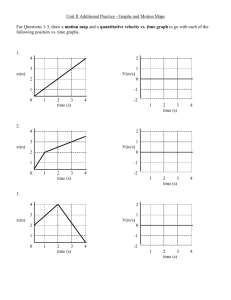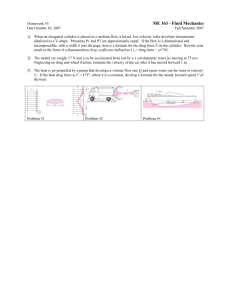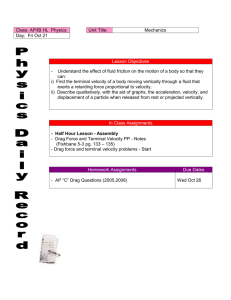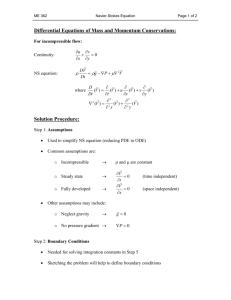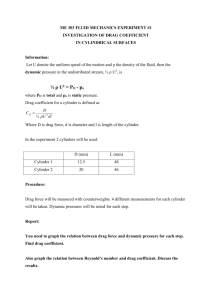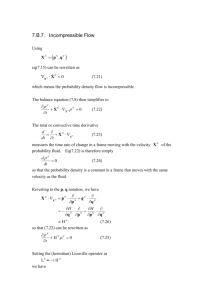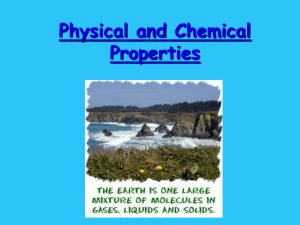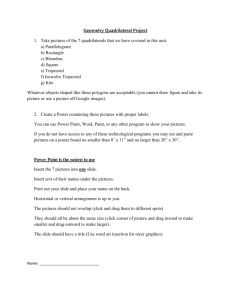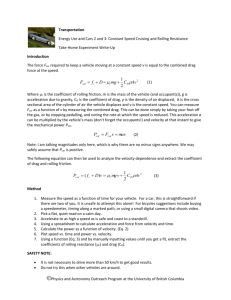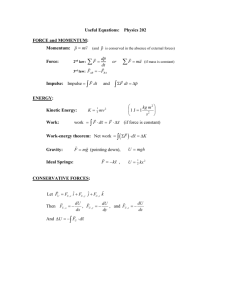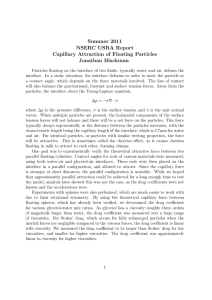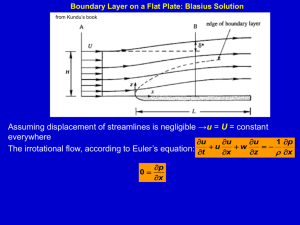DATA SHEET FOR THERMODYNAMICS AND HEAT TRANSFER
advertisement
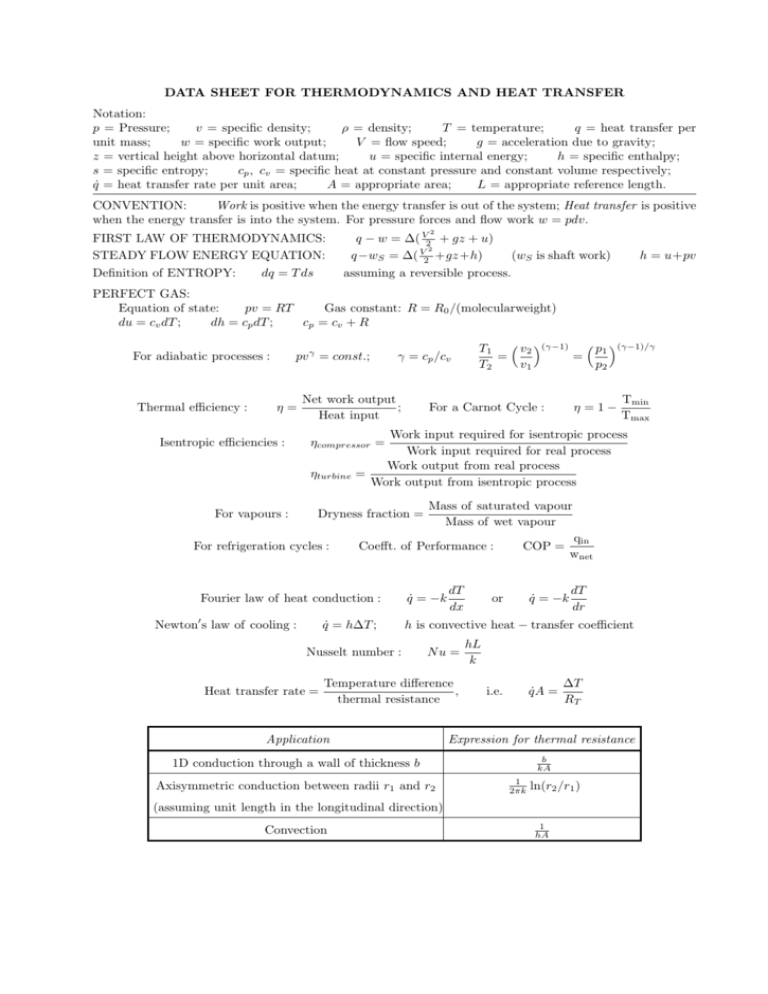
DATA SHEET FOR THERMODYNAMICS AND HEAT TRANSFER
Notation:
p = Pressure;
v = specific density;
ρ = density;
T = temperature;
q = heat transfer per
unit mass;
w = specific work output;
V = flow speed;
g = acceleration due to gravity;
z = vertical height above horizontal datum;
u = specific internal energy;
h = specific enthalpy;
s = specific entropy;
cp , cv = specific heat at constant pressure and constant volume respectively;
q̇ = heat transfer rate per unit area;
A = appropriate area;
L = appropriate reference length.
CONVENTION:
Work is positive when the energy transfer is out of the system; Heat transfer is positive
when the energy transfer is into the system. For pressure forces and flow work w = pdv.
FIRST LAW OF THERMODYNAMICS:
STEADY FLOW ENERGY EQUATION:
Definition of ENTROPY:
dq = T ds
2
q − w = ∆( V2 + gz + u)
2
q−wS = ∆( V2 +gz+h)
(wS is shaft work)
assuming a reversible process.
h = u+pv
PERFECT GAS:
Equation of state:
pv = RT
Gas constant: R = R0 /(molecularweight)
du = cv dT ;
dh = cp dT ;
cp = cv + R
pv γ = const.;
For adiabatic processes :
Thermal efficiency :
η=
Isentropic efficiencies :
Net work output
;
Heat input
v (γ−1) p (γ−1)/γ
T1
2
1
=
=
T2
v1
p2
η =1−
For a Carnot Cycle :
Tmin
Tmax
Work input required for isentropic process
Work input required for real process
Work output from real process
=
Work output from isentropic process
ηcompressor =
ηturbine
For vapours :
γ = cp /cv
Dryness fraction =
For refrigeration cycles :
Coefft. of Performance :
Fourier law of heat conduction :
Newton0 s law of cooling :
q̇ = h∆T ;
q̇ = −k
dT
dx
COP =
q̇ = −k
or
qin
wnet
dT
dr
h is convective heat − transfer coefficient
Nusselt number :
Heat transfer rate =
Mass of saturated vapour
Mass of wet vapour
Nu =
Temperature difference
,
thermal resistance
hL
k
i.e.
q̇A =
∆T
RT
Application
Expression for thermal resistance
1D conduction through a wall of thickness b
b
kA
Axisymmetric conduction between radii r1 and r2
1
2πk
ln(r2 /r1 )
(assuming unit length in the longitudinal direction)
Convection
1
hA
DATA SHEET FOR FLUID MECHANICS
Notation:
ρ = density
V = velocity (averaged over a cross-section)
p = pressure
A = cross-sectional area
d = diameter
u = local velocity in x-direction
V∞ = velocity in freestream flow (i.e undisturbed flow approaching body).
Conservation of mass (continuity equation) for steady flow through a control volume
Σ(ρV A)in = Σ(ρV A)out
Newton0 s Law of viscosity :
shear stress
τ =µ
du
dy
µ is (coefficient of) dynamic viscosity (the notation η is also used for dynamic viscosity) (units: N s/m2 );
ν = µ/ρ is the kinematic viscosity (units: m2 /s).
dp
= −ρg;
dy
Hydrostatic pressure with y upwards :
p = py=0 − ρgy
Bernoulli equation for steady, inviscid, incompressible flow;
1
p + ρV 2 + ρgz = constant along a streamline
2
It can also be written in terms of head (=p/ρg)
p
V2
+
+ z = total head (= const.)
ρg
2g
Definition of force coefficient (e.g. lift or drag coefficient)
CD or CL =
D or L
1
2
2 ρV∞ Area
Depending on the application (Length)2 (e.g. d2 ) is often used instead of area.
ρV∞ L
µ
V∞
Fr = √
gL
where L is a suitable choice of typical length. For some applications a different typical velocity from V∞ is
used.
For homogeneous incompressible flow CD = F n(Re) only.
For incompressible flows with free surfaces CD = F n(Re, F r) only.
For ships and other similar applications
Reynolds number :
Re =
CD =
CDF (Re)
| {z }
Froude number :
Skin−friction drag
Stokes drag formula for flow past a sphere at Re < 2
+ CDW (F r)
| {z }
Wave drag
D = 3πV∞ dµ.
Steady flow momentum equation as applied to a control volume:
Net force in x − direction
Rate of outflow
Rate of inflow
=
−
acting on control volume
of x − momentum
of x − momentum
similar equations can be written for the y and z-momentums.
Laminar-turbulent transition for the boundary layer on a flat plate occurs in the range
3 × 105 < Re < 3 × 106 and for pipe flow and other similar internal flows in the range 2000 < Re < 20000.
The sudden drop in drag for spheres and circular cylinders occurs at Re ' 3 × 105 .
